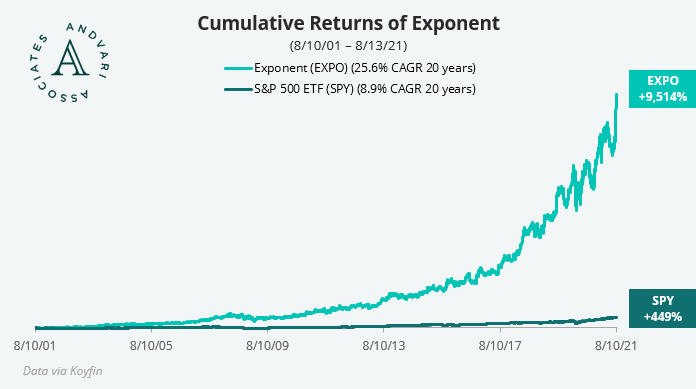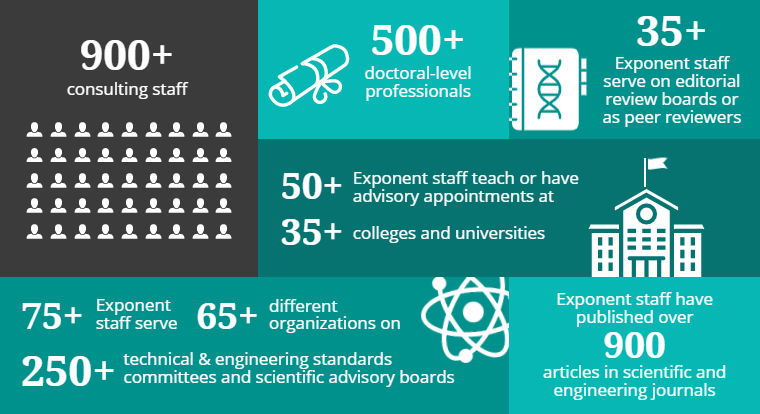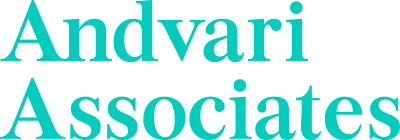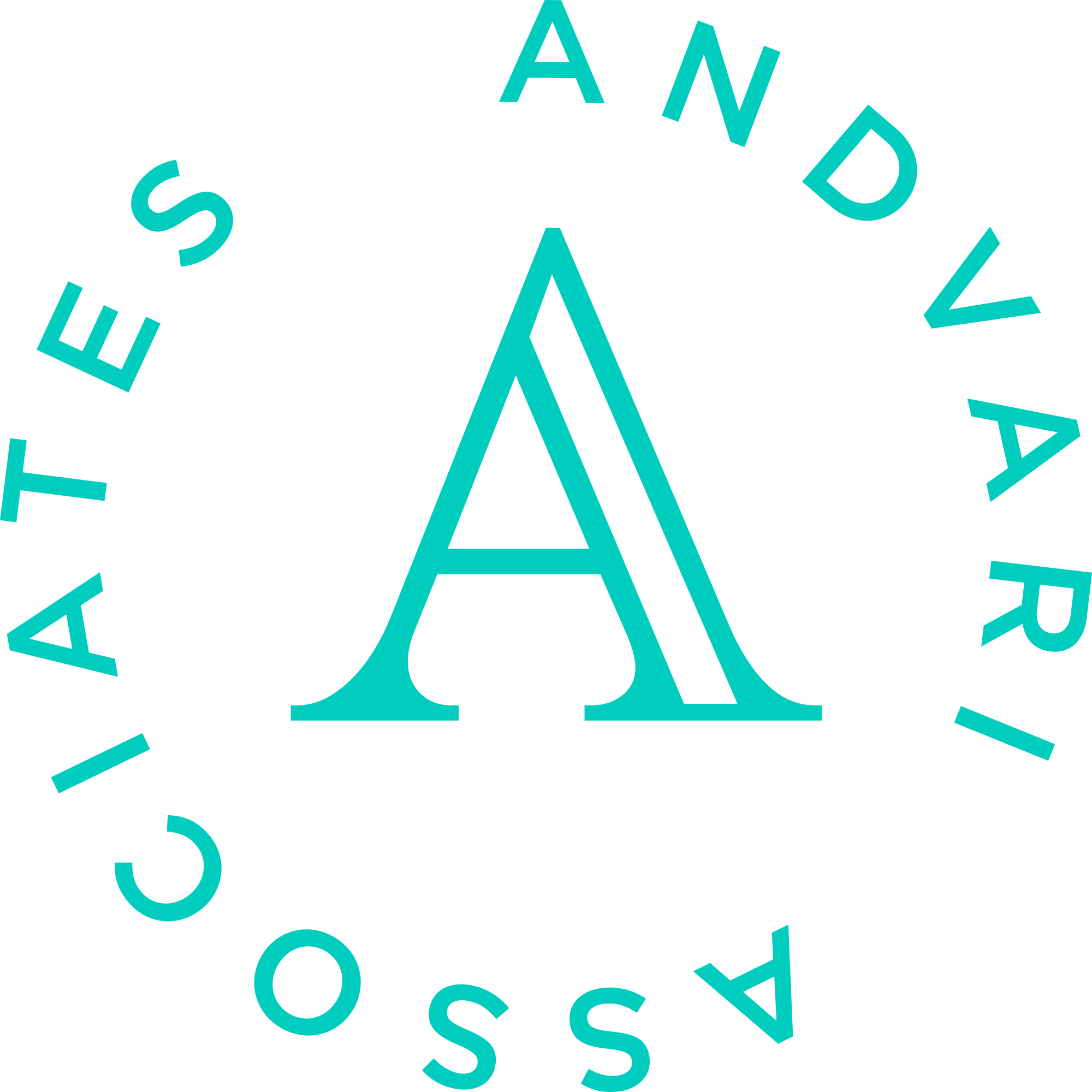The following article contains selected highlights from a live Q&A on August 10, 2021 between Douglas Ott, founder and CIO of Andvari Associates, and Catherine Corrigan, President and CEO of Exponent (NASDAQ: EXPO). At the time of the conversation and as of the publication of this transcript, Andvari clients had no position in Exponent. The transcript has been edited for clarity. Please read the full disclaimers at the end of the PDF transcript via the link below.
The complete 16-page transcript is available here or via Andvari's Client & Prospective Client Document Portal.
CATHERINE CORRIGAN – PRESIDENT & CEO OF EXPONENT
From a Family of Engineers
I come from a family of engineers and technical people. My father, he has a PhD in electrical engineering from Cornell. He had a career at Bell Laboratories. My older sister went into engineering. She’s a mechanical engineer at Penn and at MIT. My mother went back to school later in life and became a network software manager. The culture of my immediate family was really around technology, and science and engineering.
A Desire to Provide Immediate Solutions to Problems
At that point in time [having just completed a PhD], I would not have imagined myself in the seat that I’m in right now. It’s interesting. As you go through a PhD program, particularly on the engineering side, so much of what you see in terms of your faculty and your mentors, and what folks are doing there, they’re continuing on to do research. They’re going into postdoctoral fellowships, and then they’re becoming assistant professors, and then they’re getting tenure. This was the sort of traditional path. I applied for some of those and I followed that path. I had some opportunities along those lines, but it just wasn’t what I really thought I would be passionate about.
I really had a desire to be not doing basic research that might not see an application for 20 years or 30 years. I was much more interested in immediate solutions to problems that are happening right now. And really practical and applied solutions. I recognized I had a postdoctoral fellowship all queued up and I said, “Well, there’s this company called Failure Analysis [Exponent's former name] that looks sort of interesting.” They had come to campus at MIT to do some interviews. And so I did that interview, and the rest is history.

On Exponent's Culture of Scientific Excellence
Well, our culture around scientific excellence has been a constant throughout that time. That is a core value of the organization that has been in place and has been a foundation for the business. Our clients recognize that we are bringing the most advanced science, the most critical eye, that level of independence. That has always been there.
The company has certainly evolved over the course of time. When I started, I would say probably 85% or 90% of the portfolio of the company was this failure analysis, reactive type of business. And the nature of those engagements is very different than the engagements that we now have on the proactive space. The collaborative nature of our workplace has steadily increased over the course of time.
We have recognized the degree of differentiation that we have as a company, because of not only the critical mass of expertise, but our ability to form these interdisciplinary teams, literally at the at the snap of a finger in order to solve a client’s problem. So it’s this sort of culture of collaboration, this culture of bringing diversity in all its dimensions. Technical disciplines, years of experience. We need the industry expert who has 20, 30, 40 years of experience, but we also want the new PhD who worked on the leading edge technology, right? We can bring those together. And I really do think that that interdisciplinary collaboration that we’ve been able to foster in our culture over time, has been a big driver of the company’s success.

Exponent's Competitive Moat: Multiple, Premium Services Under One Roof
I would describe the competitive landscape as fragmented. We have competition in everything that we do. But there isn’t a single entity that’s going to have the depth and breadth that we cover. If I look at our chemical regulatory folks—we’ve got that group in both the U.K. as well as in the U.S.—they’ve got competitors in that regulatory space. But those competitors are not going to crossover into some of the reactive kind of work that we get into with chemicals.
Or if I look at our vehicle engineering practice, there are boutique accident reconstruction firms out there that are very good, that I would consider to be premium service firms. But they’re going to have a single discipline. Or maybe they’re just doing accident reconstruction and they can’t go next door to bring that human factors expert in, to be able to talk about that human operator error and operator distraction side of the equation, right?
If there’s an explosion of an oil refinery, we can handle the root cause of that explosion with our thermal scientists. But then we’re also going to look at the chemistry issues of what’s being discharged both into the air as well as into the ecological environment. And then further downstream, what are the health effects of that? And how do you monitor that? So it’s very much a soup-to-nuts kind of coverage that we have. Whereas if you went elsewhere, you you’d have to patchwork together maybe five different boutique firms.
We could be a much, much bigger company, if we decided to pursue more commodity-level professional services work. Lower costs, lower rates, lower margins: it’s just a race to the bottom. That’s not what we’re about. We want to solve the problems that only we can solve. I think our competitors have been just amazed at how much of a proactive portfolio we have been able to build. We charge the same rates for proactive work as we do for our reactive work. One person, one rate is our philosophy.
On Being "Defender-in-Chief" of Exponent's Reputation
One of my jobs—and I didn’t list this when you asked me what I spend my time on—but I am certainly the Defender-in-Chief of Exponent’s reputation. Our reputation for scientific excellence, for objectivity, independence, all of those things. The way the regulators view us, the way the scientific community views us are foundational to our success. Maintaining that reputation through the quality of the people that we hire, and through our quality management system to ensure we’re not making errors in our work, and all those sorts of things that we have in place, is incredibly important to maintaining that absolutely top-level reputation.
[End of transcript highlights]
GET THE FULL INTERVIEW
Access to the complete 16-page transcript is available here or via Andvari's Client & Prospective Client Document Portal. Please contact Info@AndvariAssociates.com to request access to the portal.
_________

_________
IMPORTANT DISCLOSURE AND DISCLAIMERS
Investment strategies managed by Andvari Associates LLC ("Andvari") may have a position in the securities or assets discussed in this article. At the time of the conversation and as of the publication of this transcript, Andvari clients had no position in Exponent. Furthermore, Andvari clients have not had a position in Exponent in the past. Andvari may re-evaluate its holdings in any mentioned securities and may buy, sell or cover certain positions without notice.
This document and the information contained herein are for educational and informational purposes only and do not constitute, and should not be construed as, an offer to sell, or a solicitation of an offer to buy, any securities or related financial instruments. This document contains information and views as of the date indicated and such information and views are subject to change without notice. Andvari has no duty or obligation to update the information contained herein. Past investment performance is not an indication of future results. Full Disclaimer.
© 2021 Andvari Associates LLC


